 ... ...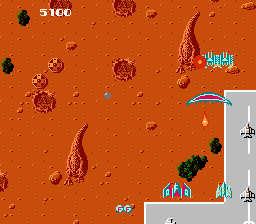
Vic Tokai's Terra Cresta is a game that sits right on the edge of the mid-80's video game renaissance. As a port of an arcade shooter (that was a sequel to an earlier game called Moon Cresta), Terra Cresta's most obvious influences are Namco's "classics", Xevious and Galaga, both games that were played more for score than to win. Yet, its focus on power-ups and boss fights places it more in-line with post-Gradius shooters - games that are played more to finish them. And that's where Terra Cresta firmly stands: with one foot planted on each side of the dividing line and none moving to the future.
 ... ...
The resemblance of Terra Cresta's continuous, vertically-scrolling environments to Xevious is unmistakable, but its bug-like enemies with their circular attack patterns are right out of Galaga. There are also a series of boss fights (four altogether, but two are identical), which might lead you to believe that beating the last one would yield some kind of an ending. No such luck. The game continues on its way, in a second loop with increased challenge. Would beating the final boss again finally earn some closure? Nope. Terra Cresta loops again, and again, and again, endlessly. At some point the difficulty maxes out, but it's hard to determine exactly when since everything looks so similar. Consequently, it's not clear when you should put the game down and consider it conquered - unless you only care to play for score.
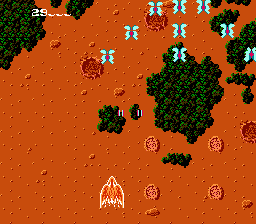 ... ...
One of Terra Cresta's most distinguishing features is a series of upgrades that culminates in the spaceship's transformation into an invincible fiery phoenix (for a limited time, of course). This system has its advantages, but its awkwardness overtakes its usefulness. Once the phoenix power wears off, you can never earn it again, because power-ups don't reappear on the ground so long as your ship already has them. The only way to get the phoenix again is to take a hit or die, thus losing your power-ups and forcing the game to cough them up.
This could, theoretically, introduce an element of strategy - you might think of taking a sacrifice hit to earn the phoenix for a crucial area. But if it wasn't a bit much asking players, who are hardwired to avoid taking hits, to intentionally fly into a bullet, it's over the line to ask us to memorize where the power-ups appear in a game world that isn't neatly divided into stages and all looks alike. It's also reasonable to question if a game should reward you early on for playing well, but have no such rewards for playing well later.
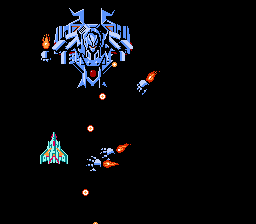 ... ...
Other problems apparent in Terra Cresta, such as frequent slowdown and flicker, might seem like issues related to the NES's hardware limitations. But when considering that Zanac, released only a year later, throws much more at you than Terra Cresta ever does without any performance problems, then it becomes clear that it was either a hasty port or the developers did not yet fully grasp the NES's capabilities. It's not just that flicker and slowdown are present - it's amongst the worst I've ever experienced. See all those halved sprites in my screenshots? Flicker. Even worse, it can actually cause your ship's weapon to stop firing. Good luck fighting the "final" boss with three power-ups in tow.
If there's anything good to say about Terra Cresta it's, well, still better than Xevious, and as the difficulty increases, it can get extraordinarily intense. If you set a hypothetical goal of looping it three times, it could take you about a week of practicing to make it that far. But it's impossible for me to not feel that whatever positive aspects it has, it's so overwhelmingly trumped by its contemporaries like Zanac, Life Force, and Dragon Spirit, that I can't even bring myself to say it would be okay if you only want to play it for score. You could play those games for score and you'd be far better off.
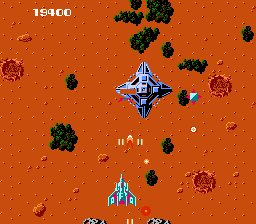 ... ...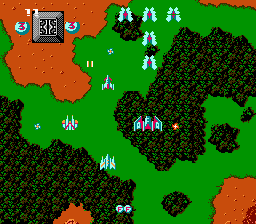
While playing Terra Cresta, I was reminded of another obscure 8-bit shooter, Sega's Astro Warrior. Like Terra Cresta, Astro Warrior has vertically-scrolling continuous stages, only three bosses, sluggish control, and no real ending to speak of. But while Astro Warrior served as a reasonable demo for the Master System's graphical prowess, Terra Cresta is merely a failed port of a game that either didn't need to be ported or required some serious revamping for the home console market.
OVERALL
SCORE: 2/5
BACK TO NES
REVIEWS BACK TO MAIN
PAGE
|

